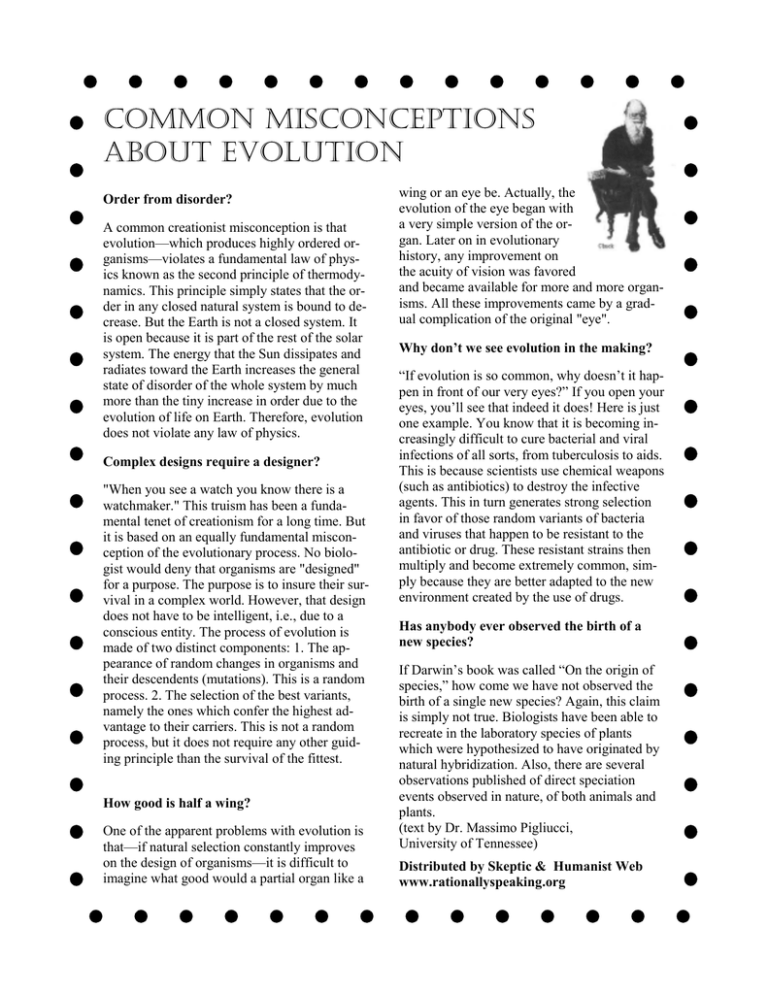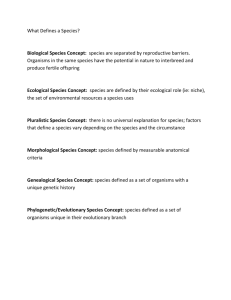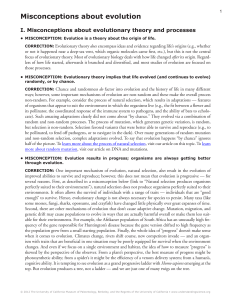COMMON MISCONCEPTIONS ABOUT EVOLUTION
advertisement

COMMON MISCONCEPTIONS ABOUT EVOLUTION Order from disorder? A common creationist misconception is that evolution—which produces highly ordered organisms—violates a fundamental law of physics known as the second principle of thermodynamics. This principle simply states that the order in any closed natural system is bound to decrease. But the Earth is not a closed system. It is open because it is part of the rest of the solar system. The energy that the Sun dissipates and radiates toward the Earth increases the general state of disorder of the whole system by much more than the tiny increase in order due to the evolution of life on Earth. Therefore, evolution does not violate any law of physics. Complex designs require a designer? "When you see a watch you know there is a watchmaker." This truism has been a fundamental tenet of creationism for a long time. But it is based on an equally fundamental misconception of the evolutionary process. No biologist would deny that organisms are "designed" for a purpose. The purpose is to insure their survival in a complex world. However, that design does not have to be intelligent, i.e., due to a conscious entity. The process of evolution is made of two distinct components: 1. The appearance of random changes in organisms and their descendents (mutations). This is a random process. 2. The selection of the best variants, namely the ones which confer the highest advantage to their carriers. This is not a random process, but it does not require any other guiding principle than the survival of the fittest. How good is half a wing? One of the apparent problems with evolution is that—if natural selection constantly improves on the design of organisms—it is difficult to imagine what good would a partial organ like a wing or an eye be. Actually, the evolution of the eye began with a very simple version of the organ. Later on in evolutionary history, any improvement on the acuity of vision was favored and became available for more and more organisms. All these improvements came by a gradual complication of the original "eye". Why don’t we see evolution in the making? “If evolution is so common, why doesn’t it happen in front of our very eyes?” If you open your eyes, you’ll see that indeed it does! Here is just one example. You know that it is becoming increasingly difficult to cure bacterial and viral infections of all sorts, from tuberculosis to aids. This is because scientists use chemical weapons (such as antibiotics) to destroy the infective agents. This in turn generates strong selection in favor of those random variants of bacteria and viruses that happen to be resistant to the antibiotic or drug. These resistant strains then multiply and become extremely common, simply because they are better adapted to the new environment created by the use of drugs. Has anybody ever observed the birth of a new species? If Darwin’s book was called “On the origin of species,” how come we have not observed the birth of a single new species? Again, this claim is simply not true. Biologists have been able to recreate in the laboratory species of plants which were hypothesized to have originated by natural hybridization. Also, there are several observations published of direct speciation events observed in nature, of both animals and plants. (text by Dr. Massimo Pigliucci, University of Tennessee) Distributed by Skeptic & Humanist Web www.rationallyspeaking.org




